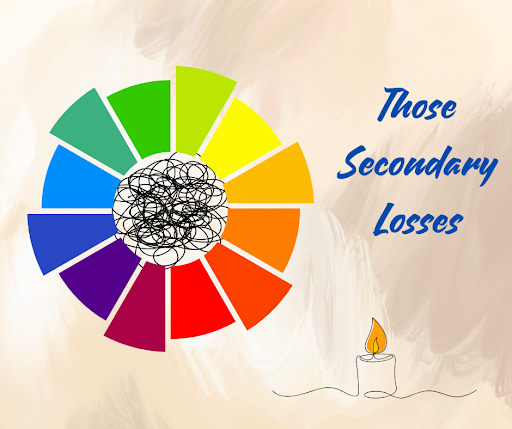Our grief journey begins with the emotions centered around losing the person with whom we shared our world. Their loss is the focus of our grief. However, when we lose our partner in life, we are not only faced with their loss; we also find other losses associated with our spouse’s passing. These losses are difficult to identify and even more challenging to explain to others. Many can understand that we lost our person, but cannot understand the other losses in our lives.
They are called secondary losses. They are all the things that have changed due to our loss. For example, one widow we spoke to talked about how she now had to take the garbage to the road. She had lost her person to share the daily chores. To others, this may seem like a little thing; however, to someone who is in grief, this can be a big difference.
Secondary losses can feel devastating as we realize the totality of what we have lost and how it will change our lives. It can catch us off guard when doing simple things.
Jeni and her husband used to put Christmas lights on the tree together, and when she tried to do this simple task without him, she decided that it was OK to purchase a pre-lit tree for future years. Her way of acknowledging that particular secondary loss was to find another way to approach the task.
Teresa found that she couldn’t open the electric gate on the ranch driveway when the power was out. She had to find a wrench in the pouring rain and added her own puddle of tears as she figured out how to open the darn thing when the power was out. The gate remained disconnected for many months and got a daily grumble as she opened and closed it manually.
Though others may not see and be able to empathize with this part of grief, secondary losses are very real. They deserve to be recognized along your journey.
What are secondary losses?
Secondary losses are the additional, often unforeseen impacts that arise when we lose a loved one. These pieces of your life are connected to your spouse and your shared future. These pieces that now feel fractured or missing altogether. Secondary losses can include:
- The loss of future plans—dreams for your future that were built together, life milestones, vacations you looked forward to, retirement plans you imagined.
- Changing family dynamics—Relationships with in-laws and extended family may change unexpectedly, leaving you feeling detached.
- Change in friendships—Friends may glom on to you or distance themselves, and often don’t know how to show up for you. The couple of friends you had can be especially challenging and often dissolve. This can leave you feeling isolated and hurt.
- Traditions and routines – Holidays, birthdays, anniversaries, life events, and daily rituals will be different and may feel hollow without your person.
- Financial stability – loss of income, increased debt, housing, and dealing with finances are often added burdens.
- Emotional stability—Your sense of security may have vanished along with your partner, and your identity as a caregiver, spouse, parent, or individual has changed. This can lead to less self-confidence and feeling unsure of what to do and how to manage daily tasks.
Secondary losses are often silent
These losses are often hidden and unseen by those around us. Without others understanding why canceled trips and changing friendships cause us so much hurt, these additional losses can feel isolating. One thing to remember is that it is OK to feel emotions about these losses, and there is no reason for you to explain your process.
Ways to process secondary loss:
- Name what’s changed – make a list
Teresa has her coaching clients make a list of all of the losses. You’ve lost more than your spouse; you’ve lost the person to take the trash out, open the gate, and help you put up Christmas lights. Putting words to the loss by writing them in a journal, saying them out loud, or sharing with someone you trust can help you acknowledge the myriad of losses you are experiencing. - Let yourself grieve each loss
Take time to grieve your list of losses. Every loss deserves to be honored. It’s okay and normal to process, cry, and rant about the loss, no matter how trivial it may seem. These losses are real, and taking time to grieve them is part of the process. Taking time to grieve the loss of your planned future or broken tradition, loss of friends, can be healing. - Take your time to grieve and build your new future
Take the time you need to decide what new routines, relationships, or dreams feel safe and right for you, not what others expect. You don’t need to rush into a “new normal”. Set your own realistic expectations for what works for you and your life right now. - Prioritize Self-Care – Prioritizing your physical and mental well-being can bring you moments of relaxation and bits of joy. Find new hobbies and things that fill your time in a meaningful way.
You are not alone
As you are traveling your grief journey and finding these invisible secondary grief layers, know that secondary losses are a part of the process. You are not alone. Though they are called secondary losses, there is nothing small about them. Each one may create different types and levels of emotions and reactions. They are all valid. As we heal along the way, we learn to make room for all the parts of our journey, the loud and the quiet. Healing does not mean forgetting it means that we are finding new ways to move forward in life.
Remember, this is YOUR journey that you get to travel your way and at your own pace.
Peace & Blessings,
Teresa & Jeni
PS: For additional support, you can download our free copy of 10 Ways to Move Forward After Loss
The First Days: Coping with Life After Loss is a resource for the first days after a loss – available on Amazon in paperback.
My Journey as a Widow: A Widow’s First Journal is a follow-up journal for processing complex emotions and moving forward with hope. It is available in paperback on Amazon.
Follow us on Social Media:
Facebook: https://www.facebook.com/TornInHalfwidows/
LinkedIn: https://www.linkedin.com/company/torn-in-half/




